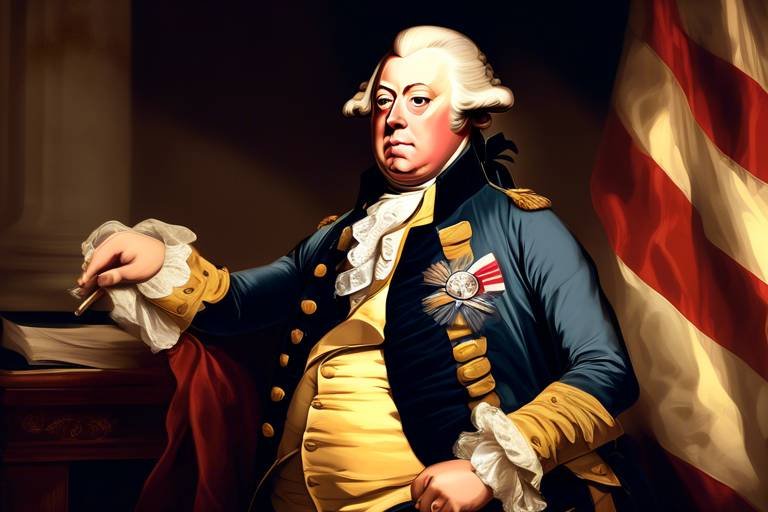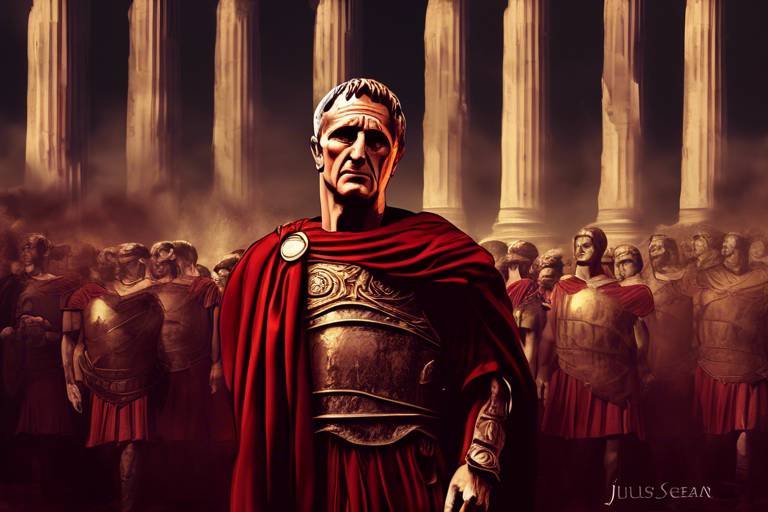George III: The King During the American Revolution
King George III, a prominent figure during the American Revolution, played a crucial role in shaping the course of history during a tumultuous period. His actions and decisions reverberated not only throughout the British Empire but also across the Atlantic, impacting the relationship between Great Britain and its American colonies. Let's delve into the life and reign of George III, exploring the complexities of his rule and the lasting legacy he left behind.

Early Life and Ascension to the Throne
George III, born in 1738, was the grandson of King George II and the son of Frederick, Prince of Wales. His early life was marked by a strict upbringing and a strong emphasis on education, preparing him for his future role as the King of Great Britain. Despite facing challenges in his family dynamics and political environment, George III ascended to the throne in 1760 at the age of 22, following the death of his grandfather.
Upon becoming king, George III was determined to assert his authority and make significant contributions to the governance of the British Empire. His reign was characterized by a desire to strengthen the monarchy and restore its influence, shaping his early policies and decisions. George III's commitment to his role as a monarch was evident in his efforts to navigate the complex political landscape of the time and establish his position as a leader.
As George III consolidated his power and established his authority, he faced various challenges both domestically and internationally. The early years of his reign were marked by tensions with the American colonies, as well as conflicts within his own government. Despite these obstacles, George III demonstrated a strong will and determination to uphold the principles of monarchy and protect the interests of the British Empire.

Political Policies and Actions
King George III's political policies and actions played a significant role in shaping the landscape that led to the American Revolution. Known for his assertive leadership style, George III implemented policies that fueled tensions with the American colonies. One of the pivotal actions was the imposition of taxes, such as the Stamp Act and the Townshend Acts, which sparked outrage among the colonists. These measures aimed to assert British authority over the colonies but instead fueled resistance and anti-British sentiments.
Furthermore, George III's unwavering stance on maintaining control over the colonies, coupled with his refusal to address the grievances of the colonists, exacerbated the growing discontent. His policies of increased centralization and assertion of royal authority clashed with the colonists' desire for greater autonomy and representation in decision-making processes.
Moreover, George III's support for harsh measures to suppress dissent, such as the deployment of British troops to quell uprisings and the implementation of coercive acts like the Intolerable Acts, further escalated tensions and pushed the colonies closer to open rebellion. His rigid approach to governance and reluctance to engage in diplomatic solutions deepened the divide between Britain and the American colonies.
In addition to his political decisions, George III's personal involvement in the management of colonial affairs, bypassing established channels of governance, contributed to the deterioration of relations with the colonies. His belief in the divine right of kings and his conviction that the colonies were subject to his direct authority fueled resistance and ultimately played a role in triggering the American Revolution.

Relationship with American Colonies
King George III's relationship with the American colonies was tumultuous and marked by escalating tensions that eventually led to the outbreak of the American Revolution. His policies and actions played a significant role in alienating the colonists and fueling their desire for independence. George III's firm belief in the authority of the British crown clashed with the growing demands for self-governance and representation from the American colonies.
One of the key points of contention was George III's unwavering support for measures such as the Stamp Act and the Townshend Acts, which imposed taxes on the colonies without their consent. These actions sparked widespread protests and resistance, with many colonists viewing the King as a tyrant who disregarded their rights and freedoms.
Despite efforts at reconciliation, such as the Olive Branch Petition, which sought to restore peace between Britain and the colonies, George III remained steadfast in his resolve to assert British authority. His refusal to compromise and his insistence on using military force to quell dissent only served to further inflame tensions and push the colonies towards open rebellion.
As the conflict escalated into full-scale war, King George III played a central role in directing British military operations against the American forces. His decisions, including the hiring of Hessian mercenaries and the implementation of harsh counterinsurgency tactics, deepened the animosity between the two sides and hardened the resolve of the colonists to fight for their independence.
Despite the eventual defeat of the British forces and the recognition of American independence, George III's relationship with the American colonies left a lasting impact on both sides. The legacy of mistrust and resentment that characterized his reign during the Revolution continued to shape the historical narrative and influence perceptions of the British monarchy in the years that followed.

Role in the American Revolution
During the tumultuous period of the American Revolution, King George III played a significant role that shaped the course of history. Known for his staunch resistance to colonial demands and unwavering belief in British authority, George III's actions had profound implications for the conflict.
As the sovereign of Great Britain during the late 18th century, George III was directly involved in the decision-making processes that led to the outbreak of the American Revolution. His policies, including the imposition of taxes such as the Stamp Act and the Tea Act, sparked outrage among the American colonists and fueled the flames of rebellion.
King George III's military strategies and declarations further escalated tensions with the colonies. His refusal to address the grievances of the colonists and his deployment of British troops to quell dissent only served to intensify the conflict. The issuance of the Proclamation of 1763, which restricted westward expansion, also contributed to the growing discontent among the colonists.
Despite facing setbacks and defeats, George III remained resolute in his efforts to suppress the rebellion. His unwavering commitment to maintaining British control over the American colonies ultimately led to a protracted and bloody conflict that would shape the future of both nations.
George III's role in the American Revolution extended beyond military actions. His influence on British policies towards the colonies, his determination to assert royal authority, and his refusal to compromise with the revolutionaries all played a part in shaping the outcome of the war.

Impact on British Monarchy
During the American Revolution, King George III's actions had a profound impact on the British monarchy, reshaping power dynamics and influencing public perception of the royal family. His handling of the conflict with the American colonies not only led to significant political consequences but also altered the course of the monarchy's reputation and authority.
One of the key impacts of George III's reign during the American Revolution was the strain it placed on the relationship between the monarchy and the British people. The costly and protracted nature of the conflict raised questions about the king's leadership and decision-making abilities, creating doubts among the populace about the effectiveness of the monarchy.
Furthermore, the outcome of the American Revolution had far-reaching implications for the British monarchy's standing on the global stage. The loss of the American colonies dealt a blow to Britain's imperial prestige and raised concerns about the stability and longevity of monarchical rule in the face of growing dissent and challenges to traditional authority.
Internally, George III's role in the American Revolution sparked debates about the monarchy's involvement in political affairs and the extent of royal power. The king's staunch resistance to concessions and his pursuit of military solutions to the conflict highlighted tensions between the crown and Parliament, fueling discussions about the balance of power within the British government.
Moreover, the financial strain caused by the war and the subsequent loss of revenue from the American colonies placed additional pressure on the monarchy, leading to economic challenges and calls for greater accountability and transparency in governance. These developments had a lasting impact on the British monarchy's relationship with its subjects and set the stage for future reforms and changes in the political landscape.

Personal Health and Later Years
During his later years, King George III faced significant challenges, both in terms of his personal health and the stability of the monarchy. Known for his struggles with mental health, George III's condition worsened over time, leading to periods of incapacitation and regency. The king's mental illness, now believed to be a result of porphyria, a rare genetic disorder, greatly impacted his ability to rule effectively.
As his health declined, political power gradually shifted away from the king, with his son, the Prince of Wales, assuming the role of Prince Regent in 1811. This transition marked a pivotal moment in the British monarchy, as it highlighted the limitations of a monarch incapacitated by illness. Despite this, George III's reign continued until his death in 1820, making him the longest-reigning king in British history at that time.
George III's later years were also marked by the challenges faced by the monarchy in a rapidly changing world. The American Revolution had already established the United States as an independent nation, challenging the traditional power dynamics of the British Empire. The loss of the American colonies under George III's rule had a lasting impact on the monarchy, reshaping its relationships with other territories and influencing future imperial policies.
Moreover, the king's declining health and the political uncertainties surrounding his reign contributed to a sense of instability within the British government. The need to address succession issues and ensure a smooth transition of power became increasingly urgent as George III's health continued to deteriorate.
Despite these difficulties, George III's later years also witnessed efforts to preserve the image of the monarchy and uphold its prestige. The construction of iconic landmarks such as Buckingham Palace and the Royal Pavilion in Brighton reflected a desire to maintain the grandeur and authority of the royal family, even in the face of personal and political challenges.

Historical Legacy and Interpretations
King George III's historical legacy is a complex tapestry of interpretations and perspectives that have evolved over time. As the monarch during the tumultuous period of the American Revolution, his actions and decisions have been scrutinized and debated by historians and scholars. One of the key aspects of his legacy is the role he played in the loss of the American colonies, which significantly altered the course of British history.
Many historians view George III as a stubborn and uncompromising ruler whose policies ultimately led to the American Revolution. His refusal to address the grievances of the colonists and his insistence on asserting British authority fueled the flames of rebellion. This interpretation paints him as a symbol of royal inflexibility and the consequences of imperial overreach.
On the other hand, some historians offer a more nuanced perspective on George III's legacy. They highlight his personal struggles with mental illness, which may have influenced his decision-making during the crisis with the American colonies. This view emphasizes the human side of the king, portraying him as a complex figure facing immense challenges both politically and personally.
Furthermore, interpretations of George III's legacy often intersect with broader debates about monarchy, power, and governance. His reign marked a period of significant change and upheaval in British society, raising questions about the role of the monarchy in a rapidly evolving world. The legacy of George III serves as a lens through which to examine the shifting dynamics of authority and legitimacy in the context of the American Revolution.
In contemporary times, the historical legacy of King George III continues to spark interest and debate among scholars and the public. As new perspectives and research emerge, the narrative surrounding his reign and his role in the American Revolution may undergo further reevaluation. The ongoing reinterpretation of George III's legacy reflects the dynamic nature of historical inquiry and the enduring relevance of his reign in shaping the course of history.

Modern Perspectives and Reevaluations
Modern Perspectives and Reevaluations of King George III offer a fascinating insight into how history can be reexamined and reinterpreted over time. In contemporary times, historians and scholars are taking a fresh look at George III's reign and his role in the American Revolution. The once vilified monarch is now being viewed through a more nuanced lens, with a focus on understanding the complexities of his decisions and actions.
One of the key aspects of the modern perspective on King George III is the recognition of the challenges he faced as a ruler during a period of significant political and social upheaval. Historians are delving deeper into the personal struggles of George III, including his mental health issues, to understand how these factors may have influenced his governance and decision-making.
Moreover, reevaluations of George III's relationship with the American colonies are shedding new light on the dynamics of the time. While he was once portrayed as a tyrant who oppressed the colonists, there is now a growing acknowledgment of the complexities of the situation and the broader geopolitical context in which the conflict unfolded.
Contemporary analyses also seek to highlight the legacy of King George III beyond the American Revolution. His impact on the British monarchy, the political landscape of the time, and the public perception of royalty are all areas of interest for modern historians seeking to understand the lasting repercussions of his reign.
Overall, the modern perspectives and reevaluations of King George III serve as a reminder of the fluid nature of history and the importance of continuously revisiting and reassessing the past to gain a deeper understanding of the events and individuals that have shaped the world we live in today.
Frequently Asked Questions
- Was King George III directly involved in the American Revolution?
Yes, King George III played a significant role in the American Revolution. He made key decisions regarding the colonies, such as imposing taxes and implementing policies that fueled the colonists' discontent and ultimately led to the outbreak of the revolution.
- How did King George III's relationship with the American colonies impact the conflict?
King George III's strained relationship with the American colonies, marked by misunderstandings and disagreements, escalated tensions and hindered efforts at reconciliation. His rigid stance on colonial matters contributed to the growing divide between Britain and the colonies.
- What was the historical legacy of King George III in relation to the American Revolution?
King George III's legacy in the American Revolution is complex and subject to differing interpretations. While some view him as a tyrant who oppressed the colonies, others see him as a steadfast ruler trying to maintain order and authority. His actions continue to shape historical narratives and perspectives on the revolution.



















